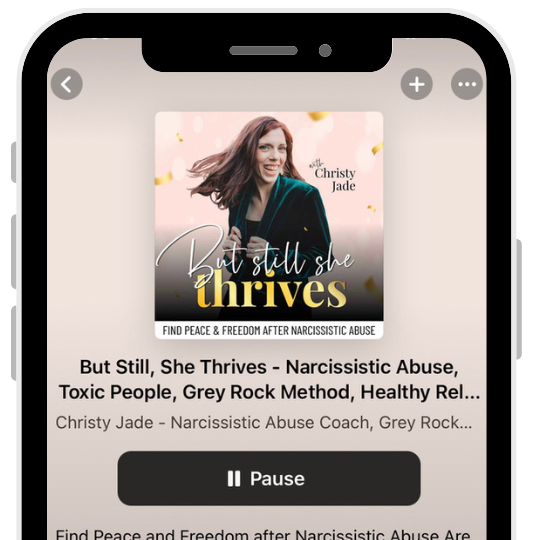Hey Queens. I am so excited you’re here today. I’m gonna talk about the top 5 signs of toxic people and how to get rid of them. Cuz guess what? We don’t like ’em. We don’t want toxic people around. Newsflash. That’s why we’re here, right? Okay. Toxic people are most likely abusive, okay? That is a majority of them are abusive and emotional abuse is often dismissed because there isn’t that physical proof like there is with physical abuse. However, it can be just as damaging as physical abuse. And many of you know this, some of you are just figuring this out, and we’re gonna dive in to those signs of toxic people and how to get rid of them.
Related Links:
Recommended Episodes
- Episode 2 (about gaslighting and more):https://podcasts.apple.com/us/podcast/ep-2-5-signs-of-toxic-people-and-how-to-get-rid/id1662241353?i=1000592070178
- Episode 5 (Grey Rock Method): https://podcasts.apple.com/us/podcast/ep-5-how-to-handle-narcissistic-abusers-the-grey-rock/id1662241353?i=1000594909977
5 Signs of Toxic People and How to Get Rid of Them
Speaker 1: (00:44)
Welcome to the, but still She Thrives podcast. I’m Christy Jade, adoring wife, adoptive mama, empowerment coach and queen of helping women who have gone through abuse, turn their lives around and start thriving. I know you are sick of feeling not good enough, questioning your decisions, not knowing how to say no, and the stress is still in your body and in your life. You’re looking for more joy and just some freaking peace. You wanna feel confident, take your power back and run your life your way. So if you’re ready to go from surviving to thriving, grab that venti mocha and let’s dig in. If you need help healing from an abusive situation or even leaving an abusive situation, you can grab a call with me. It’s $20 off your first empowerment coaching call with me over at Bitly, that’s bit.ly/firstcoachingcall . I would love to help.
Speaker 1: (01:42)
Okay, so let’s dive in. The five signs of emotional abuse from these toxic people. First of all, they criticize and judge you. They can even pass it off as joking or turn it around and tell you, you are just sensitive, right? I’m here to tell you it is not normal behavior to be constantly criticized and judged by anyone. These people do it as a power play. And if you feel like you have to even ask, are these people always critical of me? The answer’s probably yes, and that is a very good sign, right? So you’re not too sensitive, you’re not crazy, you’re a human being with normal emotions and they’re messing with you. So we’re gonna, we’re gonna say a big note of that one, okay? The next sign, they do not respect your boundaries. And you might notice they don’t respect other people’s boundaries as well, or privacy.
Speaker 1: (02:39)
So these people are very entitled and really don’t give a rat’s about what you want. Plain and simple. Often abusers are very controlling. They care about themselves and their needs over everyone else. They often really target people pleasers, people who are very over accommodating so that it is easier to control you so they can cross your boundaries without losing you. Okay? So if you feel like you tell them your feelings or you ask them not to do something and they keep on doing it, or they invade your privacy, that is definitely a red flag. Next, they are controlling and possessive, okay? Everything has to be their way. You literally fear speaking up to them or doing things your way because of the wrath that will come. I know when I went through my abusive situation, I felt like I was constantly walking on eggshells.
Speaker 1: (03:42)
I was scared to say the wrong thing or do the wrong thing at all times because I had that constant fear of if I did that, what is to come? Usually emotional abuse for me, there was physical abuse as well, right? So if you are feeling like you are afraid to speak up because of what their reaction will be, that’s another telltale sign that you are being emotionally abused. Another sign is they are manipulative and gaslight you. If you don’t know what gaslighting is, and an upcoming episode, I am going to be covering all the narcissistic tendencies and gaslighting all of this verbiage for you guys. Um, but plain and simple gaslighting in a nutshell is kind of making you feel crazy and like you’re the crazy one. You’re at fault making you believe things that aren’t true. Switching things around, there’s, it’s, it’s kind of a layered, a layered behavior that they do.
Speaker 1: (04:42)
But in the end, they manipulate and turn things to look not as they are. And in turn, you feel like you are going crazy, but you’re not the crazy one, okay? They know how to get you, these people know you. They know how to push your buttons. They know how to get in, you know, play with your heartstrings and get in there. They know how to persuade you and make you think you’re nuts. Again, you’re not right. So that is a definite sign. If you feel like you’re questioning yourself because you could have sworn X, y, Z happened and they say it went this way and they’re believable. That’s where it can get tricky because you question yourself. So a lot of these traits will add up together and you’ll realize you have been the victim of emotional abuse. And so the last one we’re gonna talk about today, these are not all of them, but just five big ones, is that they dismiss your feeling.
Speaker 1: (05:38)
This is one of my own triggers from my years of being abused, is if I feel dismissed Now, even though I’m on kind of this other side and healed a lot, there’s still a little trigger in me that feels like, oh, I just, I feel dismissed and like I don’t matter. And it kind of pokes at that wound, okay? At the end of the day, again, they care about one person themselves, not you, not your feelings, not your desires. They will dismiss you and your feelings and they don’t feel bad about it. This can get tricky and we’ll do another episode about it, but where especially narcissists and just controlling abusers will be able to fake apologies if they are desperate. Usually they won’t own up or be self-aware, but if they’re in a desperate situation where they need to fill their own need to either keep you in a relationship or have you not, you know, tell anyone and not they don’t wanna look in a bad light, they care what other people think of them, then they may do an apology and pretend to care about your feelings.
Speaker 1: (06:42)
But overall, you get the feeling they don’t really care about your feelings unless it is of a benefit to them. Okay, so you’ve evaluated, maybe you’ve checked all those lovely boxes, , and you’re like, yeah, this is where I’m at, or this is where I was and now I’m recovering and we’ll get into that in, in this podcast as a whole. But this is, you know, for everyone to just kind of validate because we often aren’t validated. So these signs are for our own validation or to evaluate if you’re currently in a situation. So if you have not gotten out of your situation and you’re in it, we’re gonna talk about how to, you know, get rid of the toxic person. If you’re on the other side, sometimes we’re still somewhat connected to the person or they’re, they still have somewhat of a hold on us.
Speaker 1: (07:32)
I know it can be very complicated. So let’s just dive into the general ways to get rid of this, these toxic people. And if you have any further questions or you want me to cover something specific, you can always email me at fiercemamac@gmail.com . Okay? Keep in mind this will depend on who the person is, your situation, are you living with them? Is it a spouse, is it a family member? Maybe there’s younger viewers that are living with someone. So it can get complicated. That’s why, again, I’d love you to send me emails with specific questions I can touch on. And uh, we can go from there. So this is kind of a generalized view and tip, okay? So if it’s someone you live with and is urgent or risky, abusive situation, okay? Where you have fear for yourself, for your livelihood, I do encourage you to call the domestic abuse hotline at 1 800 7 9 9 7 2 3 3.
Speaker 1: (08:30)
Okay? I wanna first put that out there because you’re in a situation like that, it’s more urgent and you may need some deeper support and you can get free support. So I wanna offer that there, okay? If you are in a less risky, risky situation, this could be, you know, it may be someone you live with, but they’re not violent. Um, you know, and you’re not fearing for your life or anything like that. Or it could be a friendship, it could be, you know, your aunt, it could be one of your parents, one of your siblings. These are some general tips and they’re kind of simple, but sometimes it doesn’t feel so simple when you’re in it. So I understand that. All right, so number one, evaluate if you need to have a conversation or can just bolt baby bolt , because some people we know will not respond well.
Speaker 1: (09:17)
They just, especially if it’s an abusive person, let’s be honest, they don’t normally hear your side. They make excuses, you know, they’re either going to deflect, turn it around, they’re going to be abusive, yell, get themselves out of the situation, ignore you, dismiss your feelings. All the things we kind of talked about, why are you’re here in the first place, right? And in those situations it’s, it’s best to just go quietly and quickly. You don’t have to have a conversation. And this leads me to a very important sentence. Write it in like bright pink, sparkly marker across your forehead on a mirror somewhere. Okay? I need you to hear this. You do not owe abusers anything. I don’t care who they are, I don’t care who they are. Someone who is abusive to you, you do not owe them anything. Even a conversation. They have hurt you most likely, intentionally, most likely over and over.
Speaker 1: (10:17)
You don’t owe them anything. So they often come after people pleasers or get away with abuse because they are with someone who is more passive and they know this and people pleasers accept, right? We’ve kind of accepted things as we go. There’s through this abuse and we often are tricked to feeling like we do owe them something somehow, or we’re, we are in fear, but we don’t owe them anything. Okay? So shake that people pleaser, guilt, shake it, shake it like a Polaroid picture, whatever you gotta do and run fast. Now on the other side of things, if it is, let’s say a friend that maybe, you know, they just don’t treat you totally right? You feel like maybe they’re toxic, maybe a couple of those things are checked on the list, the signs, then you can evaluate whether you wanna have a conversation. I would, if it’s a toxic person, I wouldn’t, I wouldn’t get together in person, honestly.
Speaker 1: (11:12)
I would keep it to a phone conversation where you have a little more control, it’s easier to just hang up. If you have to hang up. You can, you can script it out if you need to. You can just have one sentence. You wanna say like, look, I care about you and everything, but this friendship just isn’t working out for me. Sometimes you have to be blunt. Maybe if it’s too hard for you to be blunt, I’ve always been able to be a little more blunt than others. So these conversations tend to be a little easier for me. I am going to have a special guest that is going to help us have these conversations in a much more, um, soft and nice manner, but still to the point and in a, a safe way that you can get out of the situation and out of the conversation.
Speaker 1: (11:58)
Um, so I will have her on because my specialty is not sugarcoating . So that being said, you don’t have to have the conversation at all. If you’re not comfortable and someone’s been abusive to you, you do not owe them anything. Okay? And some may disagree with that, but that’s probably because they’re on the end of the spectrum of being a people pleaser and probably been kind of wired that way by someone in their life where they feel like they have to be at someone’s beck and call. They have to explain everything and overexplain everything. And that’s just not the situation. And if you need support, again, I am here for that. So let’s go to the next one. This is really hard for some people. Block them on social media, on the phone, the text, the phone, whatever communication you have, block it. This can be hard even if they are toxic af, right?
Speaker 1: (12:53)
If this person is emotionally abusive, again, they know how to work you and them having access to contacting you, they’ll find a reason to pry that can open with a little can opener. That’s how I always picture it. Like it just got this little space and they pry and you think, oh, it’s just a little contact. Cuz they had to ask if they could get their jacket back, okay? Mm-hmm. , because they will stick that can open in and pop it right open and dive in. And we’re trying to get their little paws off you, okay? Far, far away. So you have to block access to you. Th don’t think this is a mean thing to them, right? Because that’s where our brains can go. No, this is about protecting yourself. You say you want peace in your life and you don’t block them. That doesn’t align, right?
Speaker 1: (13:39)
Think about that. If you want peace in your life and you’re allowing an abusive person to have contact with you, that does not make sense. It doesn’t. They, those two can’t live together in the same space. If you are someone who has to have contact because you have children together, you co-parent something of that sort, yes. Obviously that’s a different situation and that’s something more customized where I can talk to you about that. Either if you write me an email or, or we do coaching together. So there are different, obviously extenuating circumstances, but in general, blocking is the best way to keep protection around you and keep the peace. Now the other thing is seeking help. There is no shame in the healing from abuse game. Okay? It is, it’s one of the things we can go through. It’s awful, right? So you deserve support.
Speaker 1: (14:29)
I recommend a therapist or a coach like myself of course, and one of which who has had experience with abuse themselves. I don’t know if all will be open to discuss that, but you are welcome to ask therapists, ask life coach. I’m an open book, obviously, you know, I’ve been through it because I’ve found even with my own therapy, my own life coaches in my life, that nobody really gets it unless they’ve been through it. That has been my experience. So it’s my preference to work with somebody who has absolutely gone through similar abuse so they can understand the ins and outs of it. All right? And finally, stay strong, right? Hold onto your boundaries, stay strong. You got this. Build the support system around you. If you need it to stay strong and give yourself grace, you will have hiccups. You might have step backwards, steps backwards, some kind of backwards, okay? ,
Speaker 1: (15:26)
Give yourself grace because it’s tough, but you’re tougher. So stay strong, give yourself grace and you got this. Remember, you deserve a happy life. You deserve to thrive. Not just get by, but actually thrive and be happy and full of joy. And if you’re not there, we will get you there together. And on the next episode, I’m going to talk about some things that I did in the beginning of my healing journey. Once I was out of the situation, some things that helped me kind of get over that hump and into a new beautiful life. So tune in next week,
Speaker 1: (16:07)
Girl. If you are over the lack of peace, the lack of setting boundaries, not feeling confident, questioning yourself, it is time to get some coaching. This is what I do, this is my specialty, it’s what I love. And I can help you more quickly than you think. If you wanna grab a call with me, I am offering $20 off of the first call and they’re only 10 spots a week and they fill up quickly. So definitely act now if you’re interested. And you can find me over bit.ly/firstcoachingcall to set that up. I look forward to helping you go from surviving to thriving cuz you deserve to be the queen you have always been. Let’s chat.


